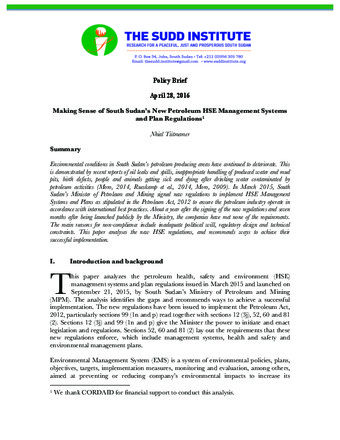Making Sense of South Sudan’s New Petroleum HSE Management Systems and Plan Regulations
Publication Summary
Environmental conditions in South Sudan’s petroleum producing areas have continued to deteriorate. This is demonstrated by recent reports of oil leaks and spills, inappropriate handling of produced water and mud pits, birth defects, people and animals getting sick and dying after drinking water contaminated by petroleum activities (Moro, 2014, Rueskamp et al., 2014, Moro, 2009). In March 2015, South Sudan’s Minister of Petroleum and Mining signed new regulations to implement HSE Management Systems and Plans as stipulated in the Petroleum Act, 2012 to ensure the petroleum industry operate in accordance with international best practices. About a year after the signing of the new regulations and seven months after being launched publicly by the Ministry, the companies have met none of the requirements. The main reasons for non-compliance include inadequate political will, regulatory design and technical constraints. This paper analyses the new HSE regulations, and recommends ways to achieve their successful implementation.
Nhial Tiitmamer has served as the Director of the Environment and Natural Resources Program at The Sudd Institute where he is currently on leave to work with United Nations in South Sudan (UNMISS). He has served as an Adjunct Assistant Professor at the University of Juba where he has taught Environmental Economics, Natural Resources Economics and Environmental Sociology. Between November 2021 and November 2022, Nhial worked as Senior Environment Associate with the United Nations High Commissioner for Refugees (UNHCR) in Juba. Before returning from Canada in 2013, Nhial worked at Arletta Environmental Consulting in Calgary and at University of Alberta’s Augustana Campus in Camrose in Alberta, Canada. Nhial’s research focusses on natural resources governance, environmental protection, climate change, and sustainable energy. He was awarded in May 2023 by the Board of Directors of The Sudd Institute with Research Impact Award for policy impacts. Nhial holds a B.A. in Environmental Studies with a minor in English Literature from the University of Alberta and an M.Sc. in Sustainable Energy Development from the University of Calgary in Alberta, Canada.

